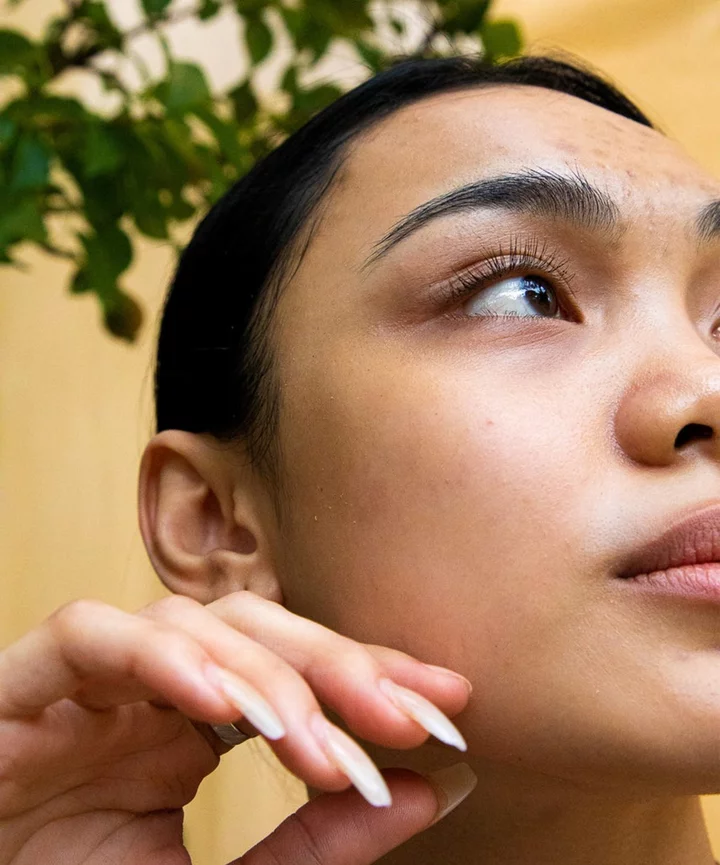Whether you’re an advocate of a 10-step skincare routine or more into “skinimalism,” chances are you’ve tried vitamin C before. Otherwise known as ascorbic acid, the skincare ingredient has multiple proven benefits: As an antioxidant, it protects the skin against environmental aggressors such as pollution; it also minimizes hyperpigmentation by controlling excess melanin (our skin’s natural pigment), and boosts collagen, which depletes as we age.
These brightening and plumping properties have undoubtedly contributed to vitamin C’s celebrity-like status. Name any skincare brand and I can guarantee it boasts at least one serum, moisturizer, or face mask with vitamin C as the star ingredient. And don’t just take my word for it: Foundation, a UK-based performance marketing agency for beauty brands, recently revealed that vitamin C is the most searched-for skincare ingredient in 2023. With an average of 8.3k google searches per month, it has left skin-rejuvenating retinol and hydrating hyaluronic acid firmly in the dust. But for all the buzz it receives, plus the praise from skincare enthusiasts and experts, there are plenty of naysayers, and they’re taking to social media to make their thoughts known.
In a recent video captioned “Why I hate vitamin C”, aesthetician and product developer Alicia Lartey didn’t hold back. “Vitamin C is not the most efficient way of dealing with pigmentation,” says Lartey — especially for those with darker skin. She adds that many of the best vitamin C serums tend to be expensive, and the higher the percentage, the more potential for irritation, particularly if you are prone to acne. “In theory, [vitamin C] sounds great. In practice, it does not deliver results,” she says. Lartey’s video amassed a handful of comments in agreement: “I hate it too!” wrote one. Another commented: “I didn’t realize how much L-ascorbic acid [a form of vitamin C] was irritating my skin until I saw a specialist.”
@alicia.larteyThis is why i hate vitamin c for hyperpigmentation. If you are using vitamin c by itself especially as a black person (or POC with deep skin), you are fighting a losing battle. Theory does not always match up to practical application
♬ original sound – Alicia -Skincare, etc 🌊Lartey and her followers aren’t the only ones to show caution regarding vitamin C. Last year, dermatologist Mark Strom, MD, went viral on TikTok for his three reasons why someone might want to avoid vitamin C, particularly if they have sensitive skin or rosacea. Not long ago, a beauty editor friend of mine revealed that a dermatologist advised her to cut the vitamin C serum from her skincare routine, as it simply wasn’t doing anything for her. Refinery29’s beauty editor, Megan Decker, recently had a bad experience with a highly concentrated vitamin C serum, which aggravated her reactive skin. Countless friends of mine have ditched vitamin C from their skincare regimens in the past few months for various reasons. All of this raises the question, is it the beginning of the end for the once-revered vitamin C?
@dermarkologist Reasons why topical Vitamin C might not be a good choose for your skin #vitaminC #antiagingskincare #skincaretips #acnetreatment #dermatologist ♬ Blue Blood – Heinz KiesslingIs vitamin C necessary in skincare?
The experts I spoke to for this article agree that vitamin C can be beneficial, depending on your skin type and the results you’re trying to achieve. “The scientific evidence is there for the skin-brightening, collagen-boosting, and protective benefits of vitamin C,” explains Justine Hextall, a consultant dermatologist at Tarrant Street Clinic, “especially when it comes to UV and pollution [because vitamin C is an antioxidant].” Sure enough, research shows that applying a vitamin C serum before sunscreen further protects skin against environmental aggressors that lead to DNA breakdown, which damages skin cells over time. However, not everyone is a good candidate for vitamin C.
“I see a lot of patients with sensitive and blemish-prone skin, especially rosacea,” explains Dr. Hextall. “I often hold back with the vitamin C until I am satisfied that I have rebalanced the skin barrier as far as I can,” she adds. “I know that when someone has super sensitive skin with significant irritation, the application of an acidic vitamin C solution can cause stinging and burning.” (This is more likely if you’re using vitamin C alongside other active ingredients, such as retinol or acids, that may sensitize the skin.) In R29 beauty editor Megan Decker’s case, user error was to blame for the reaction, which resulted in swollen eyelids and perioral dermatitis (a white, bumpy rash around the mouth): the vitamin C serum’s 25% concentration proved far too harsh for Decker’s sensitive skin. Dermatologist Shereene Idriss, MD, told Decker that anything more than 10% vitamin C could irritate sensitive skin.
Sensitive skin is a common symptom associated with rosacea, an often-undiagnosed inflammatory skin condition, which can cause redness, burning, itching, and dryness. “When it comes to vitamin C, everyone thinks the higher the percentage, the better,” says Lartey; however, the “more is more” theory could be very irritating if you have a chronic inflammatory skin condition like this, not to mention acne or eczema. If you have active acne, most dermatologists will advise you to avoid using vitamin C entirely, particularly in high concentrations, as the acidity and potential for irritation can exacerbate existing acne or cause new breakouts.
Is vitamin C good for hyperpigmentation?
It might seem counterintuitive to use vitamin C as a treatment for hyperpigmentation, which is often a result of acne. On one hand, Dr. Hextall thinks vitamin C’s antioxidant properties help protect against UV and pollution, which can be sources of unwanted pigmentation. But if you’re trying to eliminate existing marks, you might want to explore alternative options. “In theory, vitamin C works well as a tyrosinase inhibitor [which stops the enzyme tyrosinase from causing excess pigment in the skin],” says Lartey, “but in practice, vitamin C is one of the worst treatments for someone with serious hyperpigmentation or hyperpigmentation on my Black or brown clients. It has been touted as this almost ‘god-like’ skincare ingredient that protects your skin from free-radical damage and supposedly gets rid of hyperpigmentation,” says Lartey. “While I do agree that the former property is useful — and works — the hyperpigmentation aspect is a dud.”
Lartey instead prefers products that incorporate one of the following ingredients: azelaic acid, which improves skin tone and provides an anti-inflammatory effect; kojic acid, which reduces excess melanin production to brighten skin; glycolic acid, an alpha-hydroxy acid (or AHA), which chemically exfoliates the skin; lactic acid, a gentle AHA that exfoliates the top layer of the skin; and retinaldehyde, which works much faster than retinol by encouraging skin cell turnover. Dr. Hextall adds that tranexamic acid (a skin brightener that fades discoloration), arbutin (which also fades dark spots), niacinamide, and retinoids are also beneficial for pigmentation.
Similarly, during a discussion in an Instagram live not long ago, consultant dermatologist Anjali Mahto said that she could “take or leave” vitamin C. Like Dr. Hextall, Dr. Mahto mentioned solid data detailing the benefits of vitamin C, but Dr. Mahto doesn’t like layering lots of products onto her skin. “I don’t like products being layered on my patients’ skin, either,” Dr. Mahto said. “The more variables I put into my treatment plan, the more likely it is that you will get peeling, irritation, and sensitivity. I would rather use less products but use more effective products.”
What are the downsides of vitamin C in skincare?
Vitamin C is complicated: Skincare brands often present us with multiple versions (L-ascorbic acid, ethyl ascorbic acid, ascorbyl glucoside to name a few), each in differing concentrations with percentages varying from 5% to an eye-wateringly high 30%. Then there’s the question of how much vitamin C to use, and when, not to mention which skincare products are safe to combine it with (like sunscreen), and which aren’t (for example, it’s best to avoid mixing it with retinol or exfoliating acids to avoid further irritation).
It’s little wonder we’re confused, and even the experts can relate: “I am a consultant dermatologist and I struggle with percentages and formulations of vitamin C,” says Dr. Hextall. Essentially the most active form of vitamin C is L-ascorbic acid, which you’ll spot on plenty of ingredient lists, but it is also the most unstable, according to Dr. Hextall. This means it has a limited shelf life. If you’ve ever bought a vitamin C serum only to notice that it has turned a dubious shade of orange after a few weeks, this is a sign that it has been exposed to light, air, or heat. It has become less stable and is no longer as effective. For this reason, Dr. Hextall looks for formulations that combine L-ascorbic acid with other antioxidants, such as vitamin E. Not only does this boost the product’s efficacy, but it helps stabilize the formula further, she says.
Why is vitamin C so expensive?
Despite vitamin C’s finicky nature, serums that contain the ingredient are often expensive. SkinCeuticals C E Ferulic — a favorite of Dr. Hextall and priced at a whopping $182 — is famed industry-wide, as is Dr. Barbara Sturm The Good C, $145, and Drunk Elephant C-Firma Fresh Day Serum, $78. Generally, a product’s price comes down to marketing or how much research has gone into a particular formula, says Lartey. Many brands also favor ascorbic acid, the purest form of vitamin C. Furthermore, the ingredient’s unstable nature often requires specific packaging, such as air-tight containers and dark glass bottles, which are less susceptible to light damage.
However, with costs rising left and right, many of us want to spend less on skincare: Complicated skincare routines and layering trends aren’t always feasible. Is it any wonder, then, that vitamin C seems to be getting the chop? It’s certainly difficult to justify such a high price tag when the product might not last. “[Every brand] claims to have proprietary formulas and stabilized vitamin C that works like magic,” says Lartey. “But as someone who works behind the scenes in research and development, some of these product prices are truly unfounded and unexplainable,” she reveals. In fact, Lartey believes that the price point mainly reflects a brand trying to establish the type of consumers it will have. What’s more, Lartey thinks you likely won’t need a dedicated vitamin C serum if you’re looking to include it in your routine. Much like hyaluronic acid, it could already be in your current moisturizer or even your sunscreen, so it’s worth checking the ingredients list.
What’s the difference between expensive and cheap vitamin C?
If you’re not ready to give up your dedicated vitamin C serum, will a cheap alternative work? “In my view, you tend to get what you pay for,” says Dr. Hextall. “If you are looking for an effective, stable vitamin C serum with a powerful antioxidant formulation, it isn’t going to be your cheapest purchase.” She always advises her patients on where they should splurge and where they can budget. As UV and pollution are the most damaging aggressors to our skin (causing around 80% of visible damage and photoaging) potent antioxidants like vitamin C, not to mention high factor, broad-spectrum sunscreens are key and worth the investment, says Dr. Hextall. In her experience, cheap vitamin C serums have proven ineffective or are formulated at unnecessarily high concentrations that are acidic and irritating to skin. They are subsequently often abandoned by users, says Dr. Hextall, which is money down the drain.
Not all products are created equal, though, and a handful of effective, affordable vitamin C serums exist. As someone with acne who can’t tolerate most vitamin C serums, I’ve seen positive results while using The Ordinary Ascorbyl Glucoside Solution 12%, $14.30. Ascorbyl glucoside comes from vitamin C but is less potent. Doctor and dermatology expert Anita Sturnham once told me, “It’s the only derivative of vitamin C which is converted into ascorbic acid in the skin, so you get all the ascorbic acid benefits without the reaction.” I also recommend Lumene Nordic-C Glow Boost Essence, $35.99, which brightens skin gently, and L’Oréal Paris Revitalift Clinical 12% Pure Vitamin C Serum, $27.
Overall, the best skincare product, or routine, is one that works for you, particularly where efficacy and budget are concerned. If vitamin C has transformed your skin, that’s great. Dr. Hextall believes that the right introduction to an effective vitamin C formulation, combined with good sun protection, can make skin glow, after all. But if you’re happy without vitamin C, there’s no need to get trapped in the glossy marketing or the fanfare on social media.
This story was originally published on Refinery29UK.
At Refinery29, we’re here to help you navigate this overwhelming world of stuff. All of our market picks are independently selected and curated by the editorial team. If you buy something we link to on our site, Refinery29 may earn commission.









